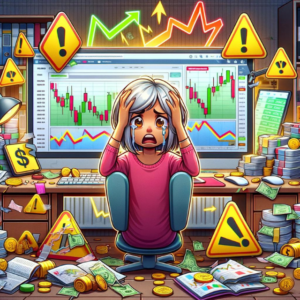Differences Between Forex and Day Trading
Investing is investing, isn’t it? Isn’t what you do on the Forex market pretty much the same experience you would have while day trading stocks? After all, both of them involve studying the economy, clicking through screens, calculating numbers, and you already know you’re looking to buy things when prices are low and sell them when prices are high in order to make a profit. How hard could it possibly be, especially when you have a good broker by your side to help you?
Although both markets involve buying and selling, they aren’t as similar as you might think. Day trading is more about long-term investments by purchasing shares in individual businesses while Forex trading is about trading currency pairs back and forth when they rise in value in order to make a profit by spending very little. Still confused? Check out some of Guerrilla Trading’s other resources on Forex trading for beginners and how to develop a winner’s trading mindset and be successful in the Forex market. If you are looking for a more personal training experience, consider taking a Forex trading course taught by us. We are very experienced in understanding the foreign exchange market and passionate about educating others on all the ways they can learn Forex trading and make a profit while doing it.
What Is Day Trading?
Day trading involves investing in stocks, buying and selling shares in thousands of businesses around the world. When you purchase a “share” of a company, it means you now own a small percentage of that company and the profit that is associated with that share. You spend your time studying companies and choosing businesses to invest in that you feel have potential to turn a profit. It’s common to “buy to hold” stocks that you intend to hold for a long time without selling.
Notably, day trading is thought to be less risky than Forex trading because it is generally easier to predict that an individual business will grow and profit than it is to predict what value another country’s currency will hold.
What Is Forex Trading?
When you start to learn Forex trading, you will quickly realize that it is not about individual businesses, but about nations around the world and their economies. Forex trading involves trading currency pairs on the foreign exchange market, and you’re faced with fewer options while you trade. Most people are interested in only a few key currency pairs, such as EUR/USD (euro and U.S. dollar), which is considered a stable pair that doesn’t run a high risk of losing you money (even though they might someday, because no one can guarantee a currency will be stable forever).
A currency’s value fluctuates every day by a small margin. This margin is measured in points of percentage, also known as “pips.” When you trade foreign currencies, you are essentially trading the money of one country over to another country where that money holds “more value” today. You do this by buying currencies while the price of them is low and selling them when the value rises, which allows you to convert the foreign currency you purchased back to your currency of choice (presumably, a currency accepted in your home country so you can spend that money).
If your prediction about rising value was correct (and if luck is on your side), then you can make profit on your currency, but if the value of the currency continues falling, you could be out a considerable amount of money. The value of any currency can change very quickly, which is why when you learn Forex trading, you will realize that it is considered to be riskier than investing in the stock market.
- Beginner’s Tip – If you are just starting to learn to trade, consider starting out with a demo account. A demo account is a great way to learn Forex trading because you can experiment with the market without risking actual funds in the process. Keep in mind, however, that because you are not attached to this fake digital currency, you are more likely to make risky trades or bulk purchases than you would with your own money, and this could skew your experience with the Forex market (meaning that once you switch to a live account, you might continue making risky trades and could end up losing money).
Major Differences Between Day Trading and Forex Trading
Regulations. The stock market is regulated by the securities and exchange commission (SEC), meaning that all trading is done in a supervised way and it’s much harder to scam or be scammed. This can make day trading a lot safer than Forex trading, especially when you are new to it. There is very little regulation in Forex trading, with all trading done between individuals in an unsupervised way.
Long-Term vs. Short Term. If you are looking to invest some extra savings in the stock market in the hopes of checking on them again in the future, then day trading may be right for you. When you day trade, your goal is to find businesses that you believe will become profitable in the future and buy shares of that company while the price of that share is low. Later, you sell it while it’s high and can make considerable profit that has accumulated over years or even decades. If you are looking for short-term gains, which can allow you to turn a profit in a much shorter amount of time, then consider Forex trading. Once you learn to trade on the Forex market, you will develop an eye for seeing value in even very small gains.
Awareness. Forex trading can be complicated because you are trying to keep up with not just one economy, but two, in order to trade currency pairs. Examples of some things you may need to keep an eye on while you learn Forex trading include the company’s unemployment rates, national disasters that may be occurring, and the gross domestic product for the year. Sometimes it can be intimidating or difficult to find news about the country you’re looking at, especially if there are language barriers in play. If you plan to learn Forex trading, it helps to have an interest in governments and economies around the world, because you’ll need to research them often in order to keep up with current trends.
Global Market. Because the Forex market is global, it’s always open and is active all throughout the day. The best time to trade on the Forex market is when the time zones line up just right for the currency pairs you are interested in trading, and you will see the highest numbers of buyers and sellers. This causes increased liquidity, which means that transactions will be processed more quickly too. Day trading, on the other hand, is usually limited to being active at the start or the end of the day.
Major Similarities Between Day Trading and Forex Trading
- Day trading and Forex trading are both dependent on prices that constantly fluctuate on the market. Every day, the belief in what is and isn’t valuable influences consumers, products, businesses, and entire economies.
- Neither market technically requires you to pay a broker in order to participate in trades. Many service providers will of course try to sell you on a broker, but it is possible to buy stocks and make currency trades without one, as long as you have a brokerage. Although you may not need to pay a broker to help you learn to trade, brokers do more than simply carry out your trade requests. They can also offer very helpful advice and keep you one step ahead of the game. Since a good broker can mean the difference between making a large profit or losing a large amount of money, we recommend you think twice before you commit yourself to going without one.
Advantages of Forex Trading
- The Forex market is much easier to access than the stock market. There is plentiful information on high quality sites online, such as Guerrilla Trading, that make the learning process simple. On the stock market, you generally need to prove you have a large amount of money on hand before you can begin trading. This is not the case with Forex, where just about anyone can create an account and begin trading currency pairs. The market is open 24 hours a day (except for weekends) which allows you to trade anywhere regardless of which time zone you are in. When you trade on the Forex market, you can also obtain access to considerable leverage, which is not as easy to do while day trading.
- The Forex market allows you more access to leverage, meaning that you can easily receive a loan that can be used for trading. Keep in mind that leverage can be bad if you become carried away; like any other money you trade in the Forex market, making large transactions is risky and you can end up blowing your leverage account.
- The Forex market is open 24 hours, meaning that unlike the stock market, it does not limit you to trading only during the day. The stock market is open between 9:30 am and 4 pm in the eastern time zone, and once the market closes for the afternoon, you won’t be able to trade again until morning. Because the Forex market is a global market, it is always open and available for you to trade on. However, this does mean that the market continues moving while you aren’t watching it, and you might suffer a few losses if you don’t invest carefully.
- There are only a few major currency pairs that are popular to trade. They are considered stable and are easy to understand, making it easy to decide where you should be investing your time and money. The EUR/USD currency pair is the most popular and is an excellent choice if you are starting to learn Forex trading (rather than trade foreign currency that may fluctuate more intensely or that you may have difficulty understanding the expected value of).
- Businesses change slowly while economies can change rapidly. Keeping up with the changes in big businesses can be complicated, especially for global companies, and especially if the usual Internet searches present you with more ads and product listings than with news about changes in the company. When you trade on the Forex market, it’s true that you should keep up with news from around the world, but with practice, you will be able to determine where to find useful sources of information and
- Trading on the Forex market allows you to profit quickly; in fact, you are encouraged to profit quickly. Currency pairs can rapidly change in value, so in a few days or weeks, you should be able to observe a chance at profit that encourages you to close the trade. There is no real benefit of holding on to your currency pairs for a long time because the market can only change so much. Unless there is a large change in the world, such as an international disaster, you will not wake up one day and find one currency valued ridiculously high compared to the other. The Forex market is built around small gains. You can profit quickly in small doses even though it will take time to build a significant amount of profit from your trading
- When you day trade, you will often find yourself struggling during a bear market: a time when prices swing rapidly between high and low and the majority tend to start dropping (like the downward swiping paw of a bear). While bear markets are a great time to buy shares low, they are a difficult time to make money because you will have very few opportunities to sell high. However, currency pairs are not usually affected by these same market fluctuations that affect the growth of businesses. You can expect to continue profiting with minimal inconveniences during a bear market when you trade foreign currency on the Forex market.
By now, you should feel confident that you know a number of differences between day trading and the Forex market, and you should know whether you are more interested in buying and selling stocks or currency pairs. Are you ready to start investing in the Forex market? Guerrilla Trading offers an abundance of resources to help you get started, including a Forex trading course that can help you learn Forex trading in a short amount of time.







